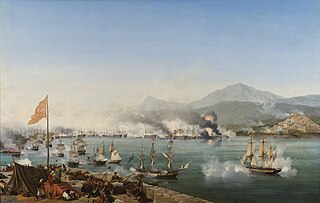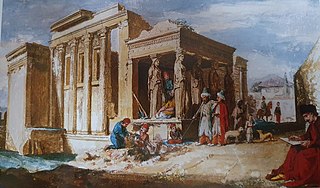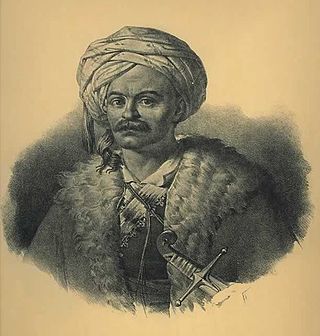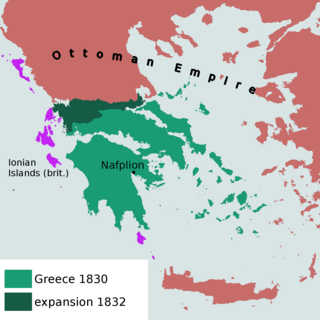Related Research Articles

The 1820s was a decade of the Gregorian calendar that began on January 1, 1820, and ended on December 31, 1829.

The Battle of Navarino was a naval battle fought on 20 October 1827, during the Greek War of Independence (1821–1829), in Navarino Bay, on the west coast of the Peloponnese peninsula, in the Ionian Sea. Allied forces from Britain, France, and Russia decisively defeated Ottoman and Egyptian forces which were trying to suppress the Greeks, thereby making Greek independence much more likely. An Ottoman armada which, in addition to Imperial warships, included squadrons from the eyalets of Egypt and Tunis, was destroyed by an Allied force of British, French and Russian warships. It was the last major naval battle in history to be fought entirely with sailing ships, although most ships fought at anchor. The Allies' victory was achieved through superior firepower and gunnery.

The Greek War of Independence, also known as the Greek Revolution or the Greek Revolution of 1821, was a successful war of independence by Greek revolutionaries against the Ottoman Empire between 1821 and 1829. In 1826, the Greeks were assisted by the British Empire, Kingdom of France, and the Russian Empire, while the Ottomans were aided by their North African vassals. The war led to the formation of modern Greece, which would be expanded to its modern size in later years. The revolution is celebrated by Greeks around the world as independence day on 25 March.

Poros is a small Greek island-pair in the southern part of the Saronic Gulf, about 58 km south of the port of Piraeus and separated from the Peloponnese by a 200 m (656 ft) wide sea channel, with the town of Galatas on the mainland across the strait. Its surface area is about 31 square kilometres (12 sq mi) and it has 3,261 inhabitants (2021). The ancient name of Poros was Pogon. Like other ports in the Saronic, it is a popular weekend destination for Athenian travellers.

Enosis is the movement of various Greek communities that live outside Greece for incorporation of the regions that they inhabit into the Greek state. The idea is related to the Megali Idea, an irredentist concept of a Greek state that dominated Greek politics following the creation of modern Greece in 1830. The Megali Idea called for the annexation of all ethnic Greek lands, parts of which had participated in the Greek War of Independence in the 1820s but were unsuccessful and so remained under foreign rule.
The Treaty of London was signed in London on 6 July, 1827 by the United Kingdom of Great Britain and Ireland, Bourbon Restoration France and the Russian Empire. The three main European powers had called upon Greece and the Ottoman Empire to cease hostilities that had been going on since the Greeks revolted against the Ottoman rule on 17 March 1821. After years of negotiation, the European allied powers had finally decided to intervene in the war on the side of the Greeks. The Allied powers wanted the treaty mainly to cause the Ottoman Empire to create an independent Greek state. It stated that while the Ottoman Empire would recognise the independence of Greece, the Ottoman Sultan would be the supreme ruler of Greece. The treaty declared the intention of the three allies to mediate between the Greeks and the Ottomans. The base arrangement was that Greece would become an Ottoman dependency and pay tribute as such. Additional articles were added to detail the response if the Sultan refused the offer of mediation and continued hostilities in Greece. The articles detailed that the Turks had one month to accept the mediation or the Allied powers forming a partnership with the Greeks through commercial relations. Measures were also adopted that if the Sultan refused the armistice, the Allies would use the appropriate force to ensure the adoption of the armistice.

The vast majority of the territory of present-day Greece was at some point incorporated within the Ottoman Empire. The period of Ottoman rule in Greece, lasting from the mid-15th century to the successful Greek War of Independence that broke out in 1821 and the First Hellenic Republic was proclaimed in 1822, is known in Greek as Tourkokratia. Some regions, however, like the Ionian islands and various temporary Venetian possessions of the Stato da Mar were not incorporated in the Ottoman Empire. The Mani Peninsula in Peloponnese was not fully integrated into the Ottoman Empire, but was under Ottoman suzerainty.
The London Conference of 1832 was an international conference convened to establish a stable government in Greece. Negotiations among the three Great powers resulted in the establishment of the Kingdom of Greece under a Bavarian prince. The decisions were ratified in the Treaty of Constantinople later that year. The treaty followed the Akkerman Convention which had previously recognized another territorial change in the Balkans, the suzerainty of the Principality of Serbia.
Early Greek parties were not features of the provisional and regional governments that were set up between 1821 and 1832. Nascent political parties were organized around a variety of interests and backgrounds, but regardless of these various factors, the political formations were named after one of the three Great Powers that established the Kingdom of Greece in 1832.

The First Hellenic Republic was the provisional Greek state during the Greek Revolution against the Ottoman Empire. From 1822 until 1827, it was known as the Provisional Administration of Greece, and between 1827 and 1832, it was known as the Hellenic State.

The Morea expedition is the name given to the land intervention of the French Army in the Peloponnese between 1828 and 1833, at the time of the Greek War of Independence, with the aim of expelling the Ottoman-Egyptian occupation forces from the region. It was also accompanied by a scientific expedition mandated by the French Academy.

Count Ioannis Antonios Kapodistrias, sometimes anglicized as John Capodistrias, was a Greek statesman who was one of the most distinguished politicians and diplomats of 19th-century Europe.

The London Protocol of 1830, also known as the Protocol of Independence in Greek historiography, was a treaty signed between France, Russia, and Great Britain on 3 February 1830. It was the first official international diplomatic act that recognized Greece as a fully sovereign and independent state, separate from the Ottoman Empire. The protocol afforded Greece the political, administrative, and commercial rights of an independent state, and defined the northern border of Greece from the mouth of the Achelous or Aspropotamos river to the mouth of the Spercheios river. As a result of the Greek War of Independence, which had broken out in 1821, the autonomy of Greece in one form or another had been recognized already since 1826, and a provisional Greek government under Governor Ioannis Kapodistrias existed, but the conditions of the Greek autonomy, its political status, and the borders of the new Greek state, were being debated between the Great Powers, the Greeks, and the Ottoman government.
The London Protocol of 16 November 1828 was an agreement among the three Great Powers, which established the creation of an internally autonomous, but tributary Greek state under Ottoman suzerainty.

The Chios expedition was an unsuccessful attempt of the regular Greek army
The Conference of Poros was a meeting held in 1828 by British, French and Russian diplomats to determine the borders of independent Greece.

The borders of Greece have changed nine times since the Protocol of London on March 22, 1829 until the accession of the Dodecanese in 1947.

The Aspropotamos–Spercheios line or Achelöos–Spercheios line was Greece's first land border with the Ottoman Empire, established by the London Protocol (1830).

The Arta–Volos line or Ambracian–Pagasetic line was the land border of the Kingdom of Greece and the Ottoman Empire between 1832 and the Annexation of Thessaly in 1881. It was named after the two principal cities in proximity of the border on the Ottoman side, Arta and Volos, and the Ambracian Gulf and the Pagasetic Gulf between which it extended.

Eastern Sporades or Eastern Islands was the name of one of the thirteen divisions created in 1828 with the administrative division of the newly formed Hellenic State by the government of Ioannis Kapodistrias.
References
- ↑ William Wrigley, "The Ionian Islands & the Restoration of Anglo-Ottoman Diplomacy, 1827–29" Südost-Forschunge (2010/2011), Vol. 69/70, pp. 51–89.